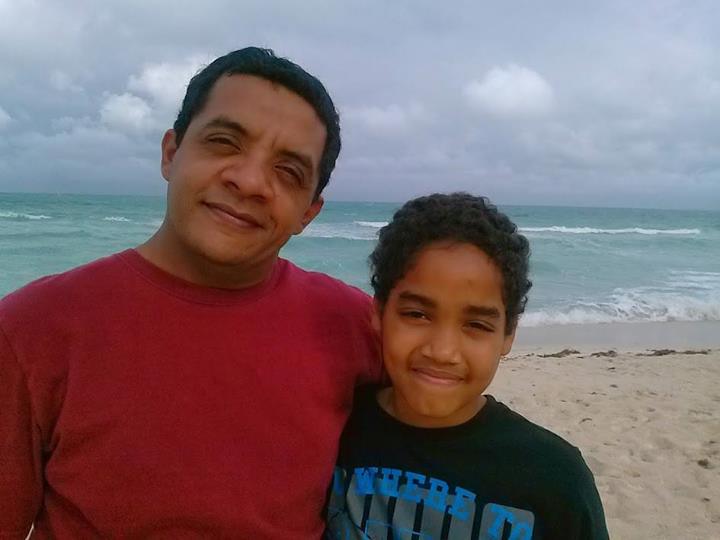 My beautiful son Malcom and I in front of the bluest sea, from Miami to Cuba (in the far distance, of course!).
My beautiful son Malcom and I in front of the bluest sea, from Miami to Cuba (in the far distance, of course!).
10 November 2013
English Translations of Cubans Writing From the Island
 My beautiful son Malcom and I in front of the bluest sea, from Miami to Cuba (in the far distance, of course!).
My beautiful son Malcom and I in front of the bluest sea, from Miami to Cuba (in the far distance, of course!).
10 November 2013
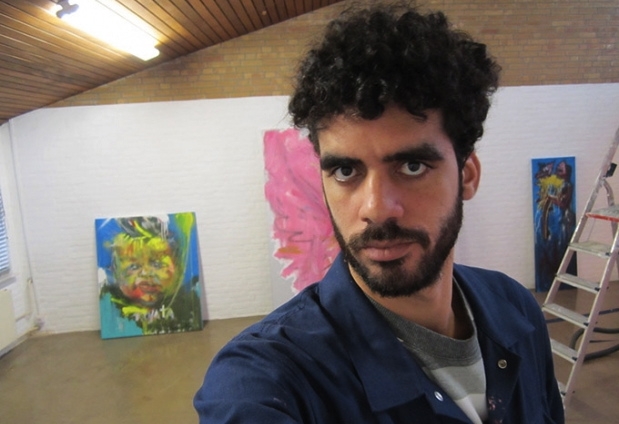
The sixth WHAT? People wondered when his graffiti started appearing around the city. And then it was more than a signature. But the irreverence is unforgiven. State Security is not about to understand this punk aesthetic, much less the art of graffiti. The forces of order are too serious.
For them, Danilo Maldonado, alias “El Sexto” (the Sixth), is a criminal who dirties (even more) the city, A coarse guy who makes everything into a joke and has no fear. So of course, there must be war. He can’t spray graffiti, much less exhibit in a gallery. This would be to accept him as an artist. And he isn’t one. He is a citizen non grata who although abroad, continues to suffer some consequences.
In this interview he talks about the most recent censorship of his work and announces his return to the Island after completing his Shelter City: the Hague fellowship, awarded by Justitia et Pax.
For El Sexto, what are the boundaries between art and social and political activism?
For me the boundaries between art and social and political activism sound like restrictions, and restrictions, to me, sound like a lack of freedom to create, and what’s more, they sound like communism.
I like the idea of breaking boundaries: and this fits with my beliefs, with what seems solid to me. I’m constantly at war with myself trying to better myself. I tell myself I have gotten this far, why not go further. If I do graffiti at night, why not do it in the day. If this is who I am, why hide. So I want to defend those who share my art, no matter what, why not do it.
I don’t understand why people put themselves in cages. For me, art is in everything. A can do a lot, even cross the lines of politics which I also believe in an art although it is practiced with lack of sincerity in my country.
People love to set boundaries, but art and politics are a game in which we ourselves impose the boundaries, not those who would limit us. So breaking them is good, because it’s the first step to finding the interior freedom that we’re lacking.
I hear you’ve set aside graffiti and started to conceive of your work in galleries. When will we see your exhibition at the Christ the Savior Gallery?
Yes, I’ve set it aside because I work all the time, so I get to experiment with canvas, cardboard. Recently I had the chance to put together at least sixteen canvases of 6 feel by eight feet, several cardboards, photographs and sculptures, for an exposition in Christ the Savior Gallery.
But as you know, my work makes the galleries panic, even the independent ones, so I’ve only exhibited at La Paja Records, and at Estado de SATS; later in the Christ the Savior Gallery, in a Graffiti Festival where I will have the chance to do a two-person exhibit with the graffiti artist and fine artist José Ernesto Rodríguez,
son of Silvio Rodriguez.
At that time, like always, it was under pressure. And they lost–only–the photos of my pieces take by the photographer Marcel.
However, when I’d put together this much work, Otari Oliva was very excited to see that finally it was possible for me to have a personal exhibition. And excited because Christ the Savior Gallery would be the first independent gallery — not associated with “activists” or “politics” — according to him — to show my work. So I left them in his house with everything arranged for September.
During that time, Otari sent me emails asking to postpone the expo until October because he was still arranging travel and such… but the same month, on 21 September, there was an exhibition held in Christ the Savior, of Ernesto Oroza.
Needless to say that made me sad. I did not understand why, if this date was planned for my first exhibition, someone would have a show before me. But fine, we went back to setting a date for October, in the first five days.
And again, emails from Otari saying that he was getting too much pressure, and that State Security wanted to see my works. What he told me was that he refused and preferred to remain silence and not to talk to the media because he’s afraid that what happened to Estado de SATS would happen to the gallery. And he also said that Chris the Savior was cultural, not political. But above all, that I should wait for everything to calm down without saying a word about my situation.
That reminded me of the attitude taken every day by the Cuban government and its repressive philosophy, “the place and time.” So I was left frustrated that couldn’t see my work and deserved an explanation. Once again, I’ve been censored by State Security and the fear some people have of keeping their word and not fighting tooth and nail for what is worthy and what they love, art.
Does that mean censorship in Cuba gains space, because who can confront them, make them give up? Do you think art and independent spaces could make a difference?
Of course. Those who have managed to snatch a scrap of earth for freedom are the independent spaces and if they give in… They [State Security] already have the formula: “I scare you a little and you give in and now everything’s fine.” But I think if someone has managed to create an independent space and proclaim it as such, then they acquire certain responsibilities, and one of them is not to be an extension of State censorship.
To what extent can you limit this negative? Have you thought about changing strategy? This could be a good turning point for how visual arts are perceived on the island, but that, I think, must be done from within.
Sometimes I feel pessimistic, especially when I see how some people behave. People do not understand that the struggle has to be waged from within Cuba. I do my work without forgetting my family. My language and my reality are there.
Then on your return how do you see Danilo as an artist? Do you go back to the streets, or maintain this change of perspectives?
The streets would love to see the last of me, but that’s beyond me, it’s my therapy. From the first graffiti I couldn’t turn away from the street. Here in the Netherlands I’ve also gotten in trouble, don’t think it’s just in Cuba.
However, sometimes I take a rest or change tools. I play with video, performance, painting, photography… I love being tested with other materials, it’s also another space outside the official, it’s simply to grow as an artist, as a human, to find other languages to express an idea. I’m just telling you there will be surprises, for the Cuban streets and for the galleries as well, why not?
María Matienzo Puerto | Havana
From DiariodeCuba.com | 9 Nov 2013
 The U.S. president , Barack Obama, on a visit to Miami to raise money for the Democratic Party, met Friday for the first time with Guillermo Fariñas and the leader of the Ladies in White, Berta Soler, both winners of the Sakharov Prize, who asked him not to negotiate with the Cuban government “regardless of exile and the people of the island.”
The U.S. president , Barack Obama, on a visit to Miami to raise money for the Democratic Party, met Friday for the first time with Guillermo Fariñas and the leader of the Ladies in White, Berta Soler, both winners of the Sakharov Prize, who asked him not to negotiate with the Cuban government “regardless of exile and the people of the island.”
At a press conference after concluding the meeting with Obama, Fariñas said the president assured him that in his next three years in office that was not going to happen. It is very important that “the world’s largest democracy recognize the Cuban dissidence,” said Fariñas.
The opponent reiterated that the President was waiting, via email, for a series of proposals to change the Cuban reality.
Fariñas said his meeting with the president established that there is a commitment from the United States to recognize the peaceful struggle in Cuba.
The leader of the Ladies in White, Berta Soler, for her part, said that in less than ten days she had met with the President and the Vice President of the United States whom she called on for moral and spiritual support for freedom in Cuba.
“We want Cuba have the same freedom that the United States has,” Soler said adding that everything the Cuban government tells the United States “is a big lie.”
The Lady in White reiterated the lack of freedoms in Cuba, but despite this, “I am a free woman,” she said.
Cubanet, 9 November 2013
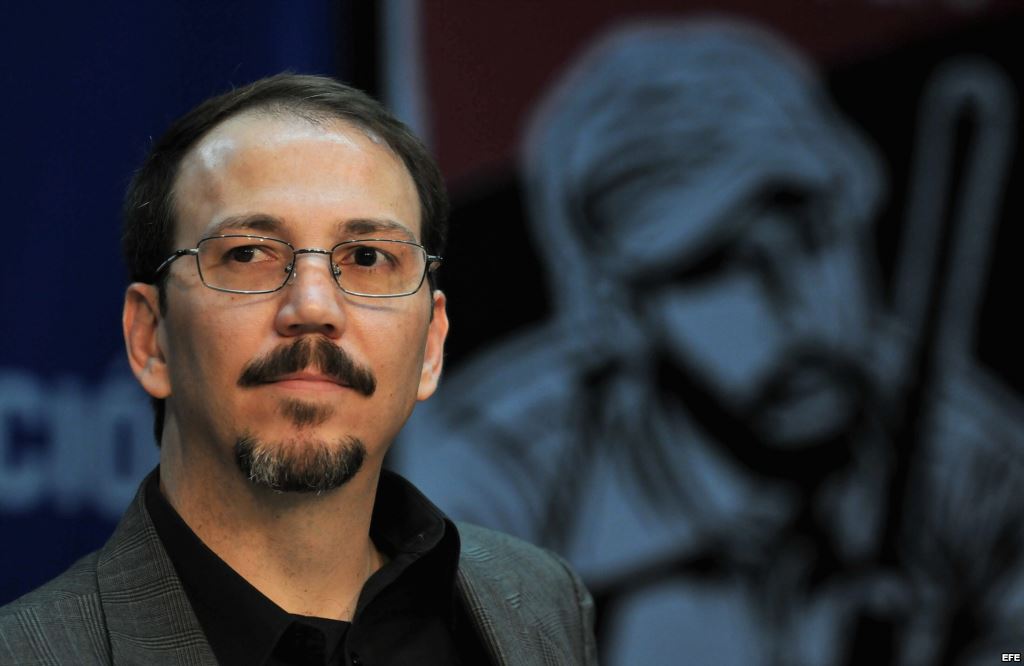 Historical data show that long before Colombus, America had already been discovered. Leif Eriksson, son of Erik the Red, was a Viking explorer who in the year 1003 managed to arrive at a land that he baptized as “Viland” and which, according to his description and remnants found, could be Newfoundland.
Historical data show that long before Colombus, America had already been discovered. Leif Eriksson, son of Erik the Red, was a Viking explorer who in the year 1003 managed to arrive at a land that he baptized as “Viland” and which, according to his description and remnants found, could be Newfoundland.
Zheng He, the famous Chinese military man, according to his travel log, between 1405 and 1433 touched the coasts of the American continent on several occasions. Khashkhash Ibn Saeed Ibn Aswad was a Muslim sailor who crossed the Atlantic Ocean and returned to Europe with evidence of his trip in the year 889. We are also familiar with the legend of Hui Shum, a Buddhist monk who by around the year 485 was preaching on the Yucatan Peninsula.
The Hindus speak of Votan, a mythological navigator who lived among the ancient Mayans. The presence of kumara on the Cook Islands, a native American plant, very similar to yams, has been cited as evidence that the native Americans could have come to Oceania. And as if that were not enough, recent scientific studies document the discovery of cocaine and American nicotine remnants in the bodies of Egyptian mummies.
Nevertheless, and in spite of this information, 12 October 1492, continues marking the history books. Sometimes, with insistent repetition, we waste time searching for a day, or a dated event, in order to build a greater uproar than that caused by the arrival of a late train at the station.
The same thing happens to us Cubans. There are more than a few enthusiasts trapped in the tricks of the almanac: they agree that if we had not had a 10 October 1868, our story would not have gotten to a 10 February 1878, a 24 February 1895, nor a 20 May 1902; nor would we have suffered a 10 March 1952, a 26 July 1953, a 13 March 1957, and much less a 1 January 1959.
Personally I think that the mentioned events occurred just as we know them today.
But history aside, and much in spite of those who only look back with the respectable, repeated and less boring eagerness of constantly theorizing in order to try to straighten out a world that already is not round, today looms the moment of being able easily to predict what the Cuban government has parceled out and designed for us as a future, that which is called “reforms.”
The question is, “Where are we going?” The answer: next December 2, when the military promotions are made known, and with whether or not Colonel Alejandro Castro Espin will rise to General or not.
A promotion that, on one hand, could create discontent and division in the military hierarchy; and, on the other, reveal to us if the so-called “measures for updating of the model” is the road towards the aftermath of the so-called Castro era, if there are openings that lead towards a (militarized) social democracy where they go on imposing little by little on the liberties of each individual or if there have only been subtle maneuvers directed at the reshuffling of the State structure which only guarantees a succession in which Cuban power passes from hand to hand, from Castro to Castro.
Each country’s government has the right to design its peoples’ tomorrow; in the same way, the people have the legitimate right to accept the future scheme or to reject it.
Translated by mlk
6 November 2013
The application in an experimental form of a new regulation on the marketing of agricultural products, contained in Decree Law 318, shows that the bureaucratic bonds that stem from the State’s desire for control have been and continue to be one of the major causes of the shortage of food.
The geniuses of the Ministry of Agriculture having just discovered that the competition generated by the emergence of other forms of buy-and-sell will have a regulatory role in setting prices, have arrived at the novel conclusion that the balance between supply and demand directly impacts production and have come to the realization — the wonders of human thought! — that the less they want to control things the better they go.
But they are still dominated by the temptation of keeping their hands on the reins. They fear that the savage best of the market will devour in one bite or knock down in one blow their jockey of central planning.
*Translator’s note: To explain the illustration of this post… the phrase Reinaldo uses is “discovering warm water.”
8 November 2013
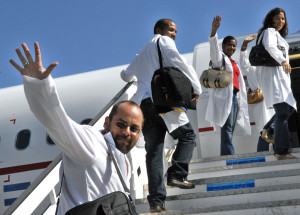 A friend of mine, whom I will refer to as “Greta”, is a doctor and holds a responsible position at a clinic in an “upscale” neighborhood in Havana. Although not well versed in political issues and ideologies in general, or in Marxism in particular, for many years she accepted membership in the PCC [Cuban Communist Party] because being a member facilitated access to certain benefits, such as getting her daughter into a child care facility quicker, a semi-boarding school for her older child, and a little faster advancement in her career, beyond what would be expected of her average talents.
A friend of mine, whom I will refer to as “Greta”, is a doctor and holds a responsible position at a clinic in an “upscale” neighborhood in Havana. Although not well versed in political issues and ideologies in general, or in Marxism in particular, for many years she accepted membership in the PCC [Cuban Communist Party] because being a member facilitated access to certain benefits, such as getting her daughter into a child care facility quicker, a semi-boarding school for her older child, and a little faster advancement in her career, beyond what would be expected of her average talents.
Greta is not, therefore, a communist revolutionary or even a system sympathizer, nor is she of the opposition, but an opportunist, sheltered into the regular rhythm of a system that does not bother you much as long as you pretend obedience and follow the guidelines.
Or at least that’s the way it was until very recently, when a “professional division” of the municipal CCP went to a meeting of militants at her clinic and expressly gave the directive for an ideological mission: because of the increasing attrition of doctors and other health professionals from the so-called internationalist missions abroad, all members of the “party nucleus” of the clinic were required to visit relatives of the deserters to inform them that such defectors should not consider themselves final émigrés, but that they had a period of two years to evaluate their return to Cuba to continue to quietly practice their profession and to enjoy “all rights”, just like the rest of Cubans on the Island. (Yikes!)
Greta dropped her nail file (she uses the nucleus meetings to update her manicure or to check her cell phone). She could not believe her ears. Now, in addition to her daily walks visiting patients, their families and doctors’ offices, responsibilities of her job, which she carries out well, she would have the additional duties of visiting the “deserters” homes because the political authorities generously “pardoned” them. She, who had managed to not participate in repudiation rallies or in sanctioning meetings, would have to “get at the conscience” of the relatives of the doctors and technicians who have left so they would, in turn, convince them of the possibilities of “returning to the motherland”.
Barely a week before, Greta had made her regular visit to the parents of a good friend, a doctor like her, one of those “deserters” who resides in the US as of a year ago and works as an ambulance paramedic. She picked up a few pictures that he had sent and had some delicious coffee sent by the ex-traitor to his parents. Her friend, or anyone who she knows of, would never dream of coming back to reclaim rights in Cuba… not even those who stopped practicing their profession and now work in other jobs in the health care field.
The militants looked at each other, perplexed. Just a few months ago, the clinic’s management had called a morning meeting to condemn the betrayal of a new defector (another one) who had betrayed his people and the revolution and didn’t even deserve a drink of water… What was this crusade now, pardoning those who had never asked to be pardoned and who, it is clear, would never make use of it? It was the height of absurdity.
And that’s the point where Greta’s tolerance collapsed. She rose from her chair and snapped at the “cadre of leaders” that that was their job to do, and not that of the doctors at the clinic. That’s why they had been assigned a salary, an air-conditioned office and a car with a tank full of gas, while she and the rest of the staff of doctors had to wear out their shoes walking the streets in the heat of the sun to accomplish their jobs. That said, Greta picked up her purse from her seat and left the meeting, leaving behind a stunned silence, followed by a murmur of approval, and barely five minutes after that, the meeting came to an end.
Greta is now waiting for the next meeting, at which they will certainly take away her party card and a great burden off her shoulders. I asked if she was afraid of losing her job and she answered, in her usual smiling and mocking way “with the great number of physicians abroad and all the ones that will continue to stay abroad, they will probably ask me to please not leave… In short, it’s likely that, along with my party card, they will take away my administrative duties, so I will fare better than before: more time to dedicate to my patients, to my family and to myself. I may even start a private practice, like some of my other doctor friends. I will be one more of so many deserters who will be staying.”
Going forward, Greta will have to be careful. This type of desertion of a doctor towards the private sector inside Cuba will certainly not be granted the authorities’ pardon.
Translated by Norma Whiting
8 November 2013
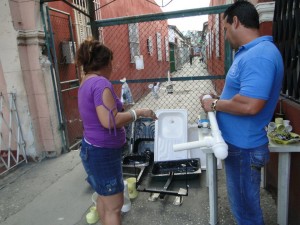 PUERTO PADRE, Cuba, November, cubanet.org — Officials in charge of overseeing the self-employment sector are updating their documentation of its licensees and subsequently warning them of possible violations.
PUERTO PADRE, Cuba, November, cubanet.org — Officials in charge of overseeing the self-employment sector are updating their documentation of its licensees and subsequently warning them of possible violations.
Eddy Vega — a manufacturer and vendor of plumbing supplies, who buys and refurbishes pieces of tubing, accessories and old keys — was warned in no uncertain terms by his interviewer that it is strictly forbidden for anyone but the state to trade in metals. Eddy, a practicing Christian, told this reporter he is thinking of turning in his business license.
Self-employed workers are summoned to the old social workers’ headquarters, where they are interviewed one-by-one.
Similarly, food sellers, carpenters, masons, people who lease out their homes and anyone who is self-employed are called to appear. A carpenter said, “It’s very difficult to work this way. It’s already almost impossible to get wood. There are too many obstacles”
Small hotel operators were summoned by city officials in Viviendas a week ago. One official who requested anonymity said, “We have to exert control… Often lodging crosses the line into prostitution.” One operator, who asked not to be identified, confessed, “I’m going to turn in my license. In the future I will take in guests discreetly like before, without paying taxes. I think I will save up all the money that for months would have gone to paying taxes for paying the fine, if I am ever caught.”
These actions by the authorities serve as a policing tool, as outlined in the Cuban Penal Code: “Those not covered under any of the dangerous categories referred to in Article 73 (habitual drunkenness and alcoholism, addiction and antisocial behavior) with links to or relationships with persons potentially dangerous to society, to other people or to the social, economic and political order of the socialist state, and who may be prone to crime, shall be given warnings by the prevailing police authorities to prevent their engaging in socially dangerous or criminal activities.”
The Penal Code also stipulates that the warning shall, “in all cases,” be issued by written affidavit, explaining the reasons for the warning as well as the response of the person being warned. It also calls for both the person being warned and the attending officer to sign the affidavit.
In spite of the stipulation in the Penal Code, police do not ask those being warned what they have to say in response to the warning. Instead they ask, “What are you involved in?”
Needless to say, self-employed workers here are not allowed to think about why they cannot acquire pieces of tubing and old keys for reconditioning and later resale.
Thursday, November 7, 2013 | Cubanet
Spanish post
7 November 2013
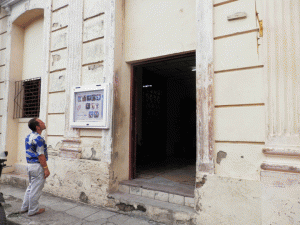 SANTA CLARA, Cuba 8 de noviembre de 2013, Yoel Espinosa Medrano/ www.cubanet.org.– The first State-owned 3D movie room, in Villa Clara province, began operations on 8 November, after government authorities announced the closure of these kinds of theaters operated by the self-employed.
SANTA CLARA, Cuba 8 de noviembre de 2013, Yoel Espinosa Medrano/ www.cubanet.org.– The first State-owned 3D movie room, in Villa Clara province, began operations on 8 November, after government authorities announced the closure of these kinds of theaters operated by the self-employed.
The room is located in the Provincial Film Center (CPC) on Luis Esteves Street in that city. The capacity does not exceed 20 seats. Showings are from 12:00 AM to 12:00 PM, with Saturday and Sunday starting at 9:00 AM with children’s shows. Admission is 5 Cuban pesos (about 20¢ US), and 10 Cuban pesos for adults.
Edey Mora Mora, director of the CPC, reported on the local radio station, CMHW, that the investment was made by the State company RTV Commercial and its production arm, Videos 4 Caminos.
With regards to private video rooms, the functionary said, “The private spaces were closed because in Cuba only State institutions directed by the Cuban Film Industry are allowed to air audiovisual programs.
Mora Mora said that they are working to rescue other rooms that are in back technical and physical condition.
On the province’s main theater, the “Camilo Cienfuegos,” currently with technical problems, located in Caro Leoncio Vidal Park, will be a multipurpose room with a capacity of 100 to show 3D films.
Yoel Espinosa Medrano
Cubanet, 8 November 2013
Havana, Cuba, November 2014. Since the past month the majority of the “Hangers” (points of sale) and rented places in the capital for the sale of clothes have put up signs announcing liquidation sales.
After three years of tolerance, the sale of imported clothes is coming to an end. Passing cuisine, clothing sales is the area where Cubans invested more of their money since Raul Castro announced the new political economy.
In early 2012, the government dealt the first blow to the sale of clothes. They imposed on residents of the island a requirement to pay the customs duties for the import of non-commercial goods in dollars.
Cubans involved in the business struggled with flea market prices in Mexico, Miami, Panama, Peru and Ecuador. They paid the customs demands and the “Hangers” spread throughout the island. The most incredulous opened caricatures of Boutiques or repaired places abandoned by the government in order to rent them.
When appearances indicated government consent with the people’s prosperity, another blow stabbed the self-employed to death.
The Executive Committee of the Council of Ministers set January 2014 as the effective date for the suspension of sales of manufactured clothing under licenses issued for “dressmaking” or “tailoring.”
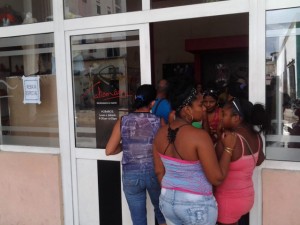
According to a note in the newspaper Granma, issued last Saturday, the prohibition is based on “the need for corrections to combat impunity, enforce the law and protect self-employed workers.”
The self-employed feel unprotected
Magdalena Carrero, 47, works as a saleswoman at the fair located on Galeano at the corner of Barcelona in Central Havana. The woman approached me while I was interviewing other sellers and asked me to publish a question to the government.
“What are they going to do with all of us left without work?”
She has two children, 7 and 22. She’s had a better standard of living since she started working in the “Hangers.” Her testimony about better salaries in the private sector coincides with what the other vendors say.
Each of them earns more than 500 pesos ($20)* monthly as a contracted salesperson for the owner or proprietor of the “Hangers.”
Maura Estela, owner of the “Hangers” on Galeano Avenue and her employees also disagree with the ban.
“We have no one to defend our rights… the CTC (Cuban Workers Center) holds a lot of congresses but no one represents us,” declares Maura.
The workers in these places note that the measure will leave a lot of people unemployed. One of them who asked not to be identified said that this kind of work attracted young unemployed people prone to crime.
“Clothing attracts youth… Look how many young people sell here, people who don’t meet the requirements to work in the government stores,” she explains.
The clothing vendors consider that their offers and prices are better than the government’s. Despite the questionably quality of the merchandise, the island has been able to keep up with international fashions for more than a decade.
“They (the government) don’t have what we offer, neither the quality nor the price,” affirms Maura Estela.
“Selling clothing made in Cuba is impossible, we don’t have resources… They can’t even manage the production of school uniforms… Let Murilla show up with underpants made in Cuba and explain why he wears a Rolex,” she added.
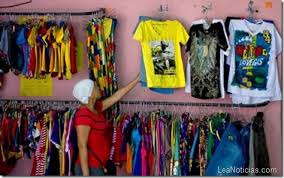 In the Central Havana Municipal Labor Office we talked to an official of the sub-branch. The attorney declared that she was not authorized to offer figures about the “Seamstress and Tailor” licenses or forecast data on the unemployment that will be caused by the ban.
In the Central Havana Municipal Labor Office we talked to an official of the sub-branch. The attorney declared that she was not authorized to offer figures about the “Seamstress and Tailor” licenses or forecast data on the unemployment that will be caused by the ban.
Solutions and challenges
The owners of the “Hangers” pay around 960 Cuban pesos (40 dollars) monthly to the government for the space, social security, workers employment plus 10% of monthly earnings. The salaries of the workers ranges between 500 and 1200 Cuban pesos a month.
Owners and workers agree that raising the taxes would be less unpopular. All of them worked, in recent months, with the hopes that the concept of the “Seamstress and tailor” license would be changed to allow the sales.
More than a few are prepared to challenge the ban
Dunia, a vendor at one of the Galiano Fairs, already knows how to support her children, 5 and 18, in 2014.
“If they prohibit the sale of clothing, I’ll go underground like before. Hidden in the stairwell of my home,” she says.
She confesses to having sold clothes illegally before the government tolerated the “Hangers.”
“I spent years juggling the sector head and the inspectors… at that time I earned more,” she says.
Now, 12 vendors pay the government some 2,500 Cuban pesos (100 dollars) monthly, for a 75 square foot space in a parking lot.
A license holder on Carlos III Avenue in the same municipality, who preferred not to be named “to avoid problems,” declared his intention to abandon the business.
She was fined when she sold from a “key” (underground store) and they confiscated her merchandise.
“In this country it’s impossible to lift your head, I’m leaving when I sell everything” she says.
Another owner of a shop located at Industria and Barcelona streets who also declined to give his name, said, “I’d rather they charged us for the license in dollars.”
He and his wife rented the room of a house where they sold clothes they themselves imported. He said they have all their money invested in a “Hanger” and added, “It’s impossible to sell all the clothes before January. We can deal with whatever measures to regulate this kind of work, but to prohibit it is to throw us out in the street, force us into the black market.”
*Translator’s note: $20 a month is higher than the average wage in Cuba.
Cubanet, 7 November 2013

By Haroldo Dilla Alfonso. A translation by The Havana Times, of an article originally appearing in Cubaencuentro.
The United Nations has once again gone through the motions of condemning the blockade/embargo imposed on Cuba by the United States. Though this gesture is very ineffective, I am happy it was repeated, for the blockade/embargo has increasingly become a stumbling block devoid of any evident advantages for anyone.
In addition to being an interventionist measure, the embargo has helped create an exceptional situation which the Cuban government has known how to use to its advantage, polarizing the island’s internal political landscape and manipulating national and international public opinion.
It is the latter I want to focus my analysis on, taking as my point of departure a number of the rhetorical maneuvers from Cuba’s Foreign Minister Bruno Rodriguez during his publicized speech before the UN General Assembly. I particularly wish to focus on the way in which Rodriguez has relied on euphemisms to give simple economic necessity a humanistic spin.
Ultimately, this leads his arguments to a kind of political dead end, evident in his remarks that describe the blockade as an act of “ignorance”, in a section of his speech which deserves a special place in the history of Cuba’s political schizophrenia.
Rodriguez says: “The blockade is an act of ignorance that prevents the free movement of people, the flow of information, the exchange of ideas and the development of cultural, sport and scientific links between our countries.”
What the stiff Cuban foreign minister means with this, in truth, is that the blockade denies Cuba tourism. Though one can reasonably expect that tourism will lead to the exchange of information and ideas between people, this is precisely the part of the whole affair that terrifies Cuban leaders, for whom the best possible international tourism would be of the kind that takes place at isolated keys, which are as close to paradise as they are distant from the reality of common Cubans.
At most, the Cuban leadership would approve of gringos and Cubans exchanging ideas about the best way to cook fried plantains, the amount of mint one should use to prepare a mojito or the advantages of oyster cocktails over Viagra pills, but not much beyond this.
But, since the blockade/embargo is framed as a humanistic issue, the discourse surrounding it cannot be besmirched with materialistic considerations. This is why Foreign Minister Rodriguez takes globalization at its word and speaks of human rights, the exchange of ideas and the flow of information.
He even bemoans the curtailment of the constitutional rights of US citizens, who are denied the right to travel to Cuba. No matter how hard Rodriguez tries to resemble Thomas Paine, however, we all know he is merely a shopkeeper, and that, behind his spiel hides Cuba’s interest in selling daiquiris, traditional summer shirts and multi-colored maracas to gringos.
Rodriguez’ efforts at sounding convincing stand a chance only within a closed circle of drowsy diplomats. His speech is divested of all sincerity from the start by the very nature of the speaker, the Cuban government, by its authoritarian character and the way in which it manipulates the rights of its quasi-citizens.
His rhetorical euphemisms turn into contradictions as soon as they are voiced, and these contradictions become sheer hypocrisy, for Bruno is one creature on the face of this earth who has no right to invoke the curtailment of rights by others, and this because he represents a State that denies Cubans the possibility of exercising such rights.
First of all, the Cuban government restricts the rights of its citizens to travel freely within Cuba. The internal movements of the population continue to be governed by a medieval decree law.
This government also denies Cuban émigrés the right to freely visit and travel around the country, a right that would be totally in keeping with a society that is already clearly transnational and relies on this condition to a considerable extent.
I believe that a highly significant part of the spiritual and intellectual production of Cubans is kept from society as a result of the repressive policies of the regime, and that this leads to the impoverishment of all, both inside and outside Cuba.
The recent migratory reform did not establish citizen rights. It only made travel legislation more permissive, leaving intact the mechanisms that maintain Cuban émigrés in their condition of exiles who are denied full rights.
Foreign Minister Rodriguez also represents a State that restricts the flow of information by denying the immense majority of its population access to the Internet (to blame this situation on the blockade is a bare-faced lie) and by maintaining strict control over the printed publications to which Cubans have access.
Numerous books, some of them written by Cuban authors whose intellectual merit has earned them international recognition, are kept on inaccessible shelves at Cuba’s National Library, and I know of cases in which whole series of works have been turned into pulp because of their ideological content.
Hundreds of works, containing the very best of intellectual production from around the world, remain out of the reach of Cubans simply because these books are published outside of Cuba, where, by contrast, all of the ideological pamphlets regurgitated by the regime’s followers are enthusiastically published.
Finally, Rodriguez is a member of a political class that curtails and represses all exchanges of ideas which take place outside the government’s restricted premises and the interesting but extremely short-lived spaces for authorized critique.
An intense production of ideas of the most varied nature is taking place within Cuba – the island and the diaspora of our transnational society, that is – and these ideas cannot be circulated or exchanged on the island.
I believe that a highly significant part of the spiritual and intellectual production of Cubans is kept from society as a result of the repressive policies of the regime, and that this leads to the impoverishment of all, both inside and outside Cuba.
To return to my previous comments, before aiming to have US tourists exchange small talk with a local waitress, I believe it would be far more productive to have a world-renown expert on social security issues (such as Carmelo Mesa Lago) converse with Cuban officials and share his ideas about the future of Cuba’s system.
Or to allow Pedro Campos to address the whole of Cuban society, so that he may explain his ideas regarding democratic socialism; or to grant this right to Siro del Castillo, so that he may speak of Christian Democratic values and their significance for Cuban society; or have a sociologist as knowledgeable about the intricacies of Latin American social development as Francisco Leon give a lecture at the university; or allow Yoani Sanchez to do the same in connection with the use of social networks and their importance to democracy, and Cuesta Morua on the many issues which he addresses so positively, among many others. Not because they are the opposition and critical of the government, but because they are Cuban intellectuals.
That this should not happen has evidently nothing to do with the blockade/embargo, but with the existence of the authoritarian and exclusivist political regime that Bruno Rodriguez represents – a government that, day after day, and against the best interests of the nation, conspires, and I quote, “against the free movement of individuals, the flow of information and the exchange of ideas.”
Haroldo Dilla Afonso, 6 November 2013, from Cubaencuentro.
Translated by The Havana Times
Once again the graphic artist Rolando Pulido echoes the suffering of Cuba and has prepared a poster calling for solidarity with Angel Yunier Remon Arzuago, who as of Thursday has completed 22 days on hunger strike, in protest of a prosecutor’s request for an eight year jail sentence, for a supposed attack.
In conversation with the wife of the controversial rapper, Yudisbel Rosello said that they had put a tube in the rapper’s neck to feed him, because he could no longer bed fed through tubes in his arm.
The young woman also reported that Carlos Manuel de Cespedes Provincial Hospital in Bayamo, where her husband Remon Arzuaga has been admitted, is completely guarded by police and State Security.
The organization NetForCuba called a protest: Thi Friday, 8 November, at 7:00 PM we will gather at the Versailles Restaurant in Miami to protest for the release of the rapper Yunier El Critico.”
#FreeElCritico
7 November 2013
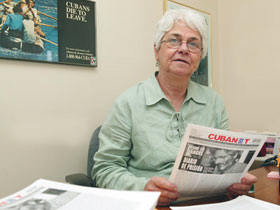 Havana, Cuba, October, www.cubanet.org – It was a great achievement by Rosa Berre (Havana, 1941 – Miami, 2006) to publicly expose the mass media of Fidel Castro, whose writers were willing to lie in exchange for crumbs.
Havana, Cuba, October, www.cubanet.org – It was a great achievement by Rosa Berre (Havana, 1941 – Miami, 2006) to publicly expose the mass media of Fidel Castro, whose writers were willing to lie in exchange for crumbs.
When, at the beginning of the internet, with the help of an old computer, a fax machine, her ingenuity and her strong personality, she thought about organizing a group of reporters that would write about the truth in Cuba, from the lion’s mouth, many thought that she was insane.
Who would dare to report about the situation of political prisoners, the inefficiency of leaders in governing the country, the systematic violations of Human Rights, the opinions of citizens, and everything that the national press hides? And what would happen to those who had such tremendous audacity?
From her home kitchen in Coral Gables, Florida, at the beginning of 1994, that lady with a sweet demeanor, but energetic, founded the page Cubanet: A refuge to all those who, marginalized, couldn’t put to use the freedom of speech, a truthful challenge to the long political hand of Castro, that could reach up even from their own neighborhood.
In that year Rosa made her wish come true and as months passed, that group of brave people increased in numbers and professional quality, with the goal of having a Cubanet with a power to influence the emergence of a civil society and inform the world of the Cuban reality.
The history of Rosita, as we used to call her with love and respect, is not well known. She graduated from the Normal School for Teachers, she studied journalism at the University of Havana, and since she was very young she belonged to that generation that trusted in the Revolution of 1959 as a solution to solve social injustices. She worked at the Periodico Hoy, which disappeared in 1965, and at the end of the 70’s woke up from the romanticism that so much pain caused to many and she was accused of having “ideology problems,” along with her life companion Carlos Quintela, who died in exile in 2001.
Both of them were expelled from their jobs and punished by being sent to do, agricultural work in Pinar del Rio; they were called “reprobates” by Raul Castro, but they kept going “…with the dignity of those who break with the Revolutionary fallacy from power,” as our Human Rights champion, Ricardo Bofill, expressed it.
In 1975 Rosita started doing crafts. Looking for the scent of freedom, in 1980 she, her husband and their two young daughters entered the Peruvian Embassy, where this family, dignified and honorable suffered for many long days perhaps the worse nightmare of their history.
Then, she suffered in the flesh the ruthless policy of Fidel Castro of inciting the Committee for the Defense of the Revolution masses to beat and harass everyone who preferred to leave Cuba, in the so-called “acts of repudiation.”
With that bitterness, with that traumatic and sad experience, Rosa and Carlos together undertook the arduous path of exile through the Port of Mariel, from where, in April of 1980, more than 125,000 Cubans began their exodus to the United States.
Today, almost twenty years after its foundation and seven years after Rosa’s death, on 19 October 2006, Cubanet continues their work to support the independent press and the right to freedom of speech and promotes the strengthening of the Cuban civil society, “… a legitimate element of democracy,” as stated by professor Vaclac Havel.
With the physical disappearance of Rosa, many in Cuba thought that Cubanet would also disappear, but, perhaps as if with unknown invisible threads the great friend, committed to Cuba’s freedom, is still protecting us; Cubanet continues to keep her legacy alive. Needless to say, each new published text in this page constitutes a tribute to Rosa Berre.
Tania Díaz Castro, Cubanet, 17 October 2013
Translated by LYD